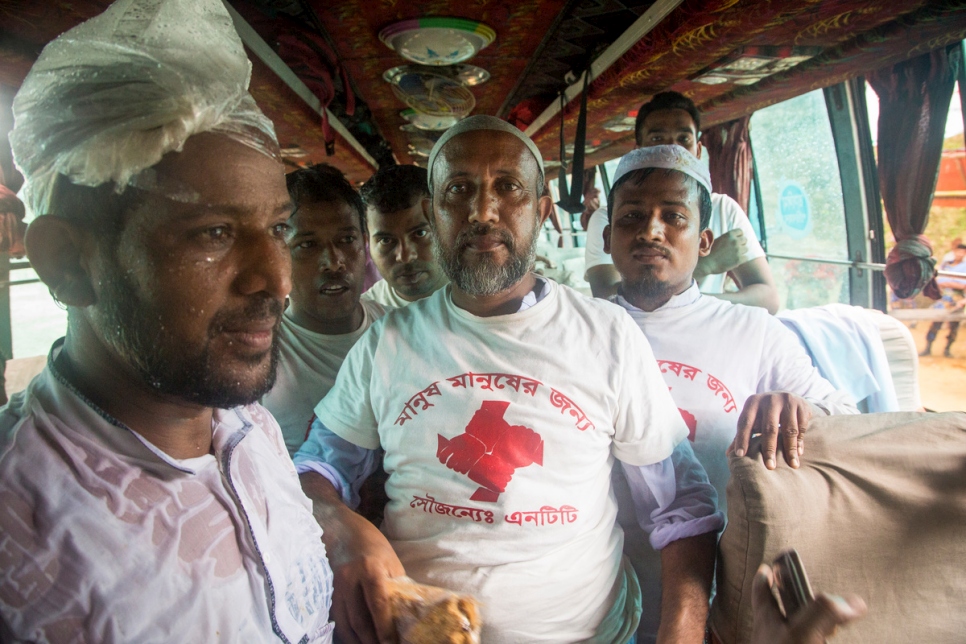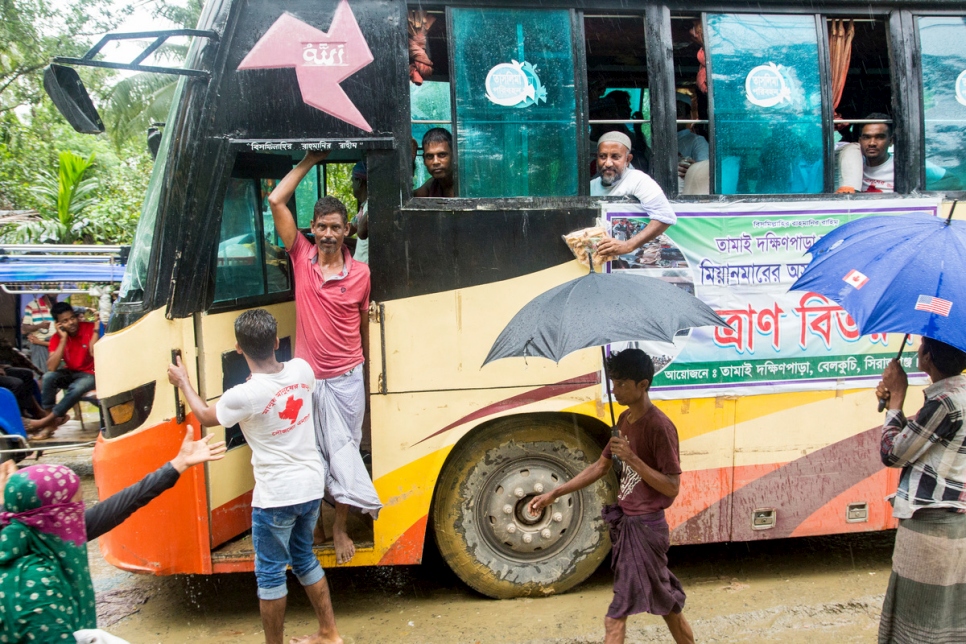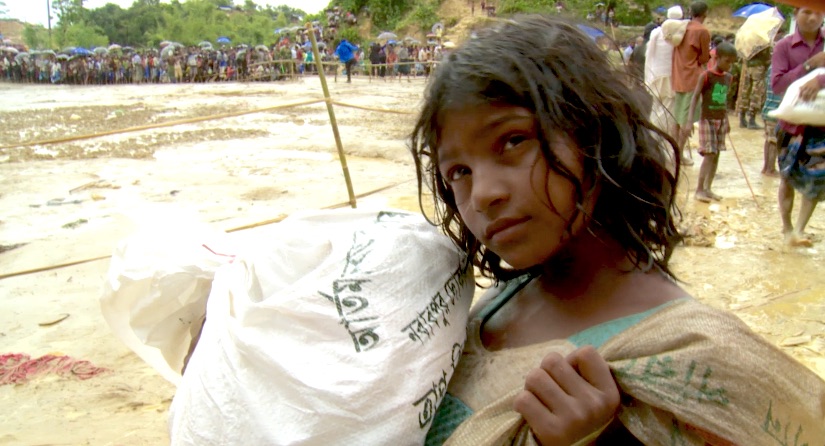Bangladeshis race to save Rohingya refugees in need
Private donors raise money, food and clothing to fill yawning aid gap as Myanmar displacement into Bangladesh tops 582,000

Haji Taish Khan (centre) and friends are among private Bangladeshi donors raising money to distribute cash, food and clothing to refugees from Myanmar. © UNHCR/Roger Arnold
MAINAR GUNA, Bangladesh – At the end of a 22-hour drive from their village in northern Bangladesh, a busload of textile workers parks in the pelting rain.
In the mud, thousands of famished men, women and children line up to receive bags stuffed with sugar, biscuits and flat rice, handed out through the fogged-up windows of the bus.
“Why are we here? To serve humanity,” says Haji Taish Khan, shrugging as if it were a silly question. “As soon as we saw the news, we knew we had to come and help them.”
- Thousands of Rohingyas have fled violence in Myanmar. Follow the crisis here.
He is referring to more than half a million refugees who have fled violence in Myanmar, most struggling to survive in abject conditions in southeast Bangladesh, where they are in dire need of just about everything.
As the volunteers pass out thousands of bags, Haji Khan explains how it was not just his workmates, but the whole village that got behind the push to save lives.
Through a donation drive, they bought enough food and clothing to fill two pallets and, with the remaining cash, rented the bus and set off for the rain-soaked hills of southeast Bangladesh, where suffering is on an unimaginable scale.
“Our whole community is involved … and we will keep on coming until the situation is stabilized,” says Haji Khan. His workmates, packed around him in the bus, nod in agreement.
In the churned-up field outside, thousands of undernourished people stand or squat in ankle deep mud, lining up to receive aid from a seemingly endless stream of donors like Haji, racing to save fragile lives.
“They come through for us, and we depend on them,” says Younus, an emaciated father, hugging a bag stuffed with high-calorie food. His family have no shelter, he says, but “at least now we have something to eat”.
The muddy space is one of 13 official points in Cox’s Bazar district for distributing the aid arriving from across the country. Officials schedule the deliveries and work with refugee community leaders to assign redeemable coupons to those in greatest need.
“We came ourselves to give it directly to the people who need it."
Next up is a high-sided truck crammed with 6,000 sacks of aid. Each contains rice, lentils, vegetables, baby milk, soap, clothes, blankets and mosquito nets, brought from the capital, Dhaka, by two dozen members of a manufacturers’ association.
“We came ourselves to give it directly to the people who need it,” says Jalal Ahmed, smartly dressed in a sports shirt and trousers, out in the mire.
As they hand out the sacks, a Bangladeshi soldier blows a whistle and swings a stick to ensure order in the long lines of refugees, among them rail-thin widow Nesaro, who is 50 but looks older. Her husband was shot dead in Myanmar and she has two daughters to feed, but no shelter of her own.
- Your support is urgently needed to help the refugees in Bangladesh. Please give now.
Tuyob, 52, a father of six, is gaunt. He receives a bag of aid from the Dhaka businessmen and says: “I’m famished. I thank God almighty for sending these people to us. This is everything to me.”
Just how large and how vital the private Bangladeshi aid rush has become is clear to Mohamed Rezual Karim, the manager in charge of Kutupalong refugee camp, one of only two government-run camps in the South Asian country. “Without the private donors, it would be a disaster,” he says.
The number of refugees in the immediate area around Kutupalong has tripled to 300,000 in a little over a month, he says. Karim estimates that fully 90 per cent of the aid reaching them comes from private donors.

Private Bangladeshi donors have raised money to distribute aid to refugees from Myanmar at Kutupalong camp. © UNHCR/Roger Arnold
In support of the Bangladesh government and people, UNHCR, the UN Refugee Agency, is working with partners to scale up aid to alleviate the worst crisis the region has seen in decades.
It has flown in five aircraft packed with shelter and other materials and has teams on the ground providing the refugees with thousands of tarpaulins and family tents. It is putting in clean water and sanitation systems, and is providing additional support to the Bangladesh government’s vaccination drive.
“The aid agencies are working systematically. In the meantime, the private donors are filling a gap,” says Shirin Aktar, a UNHCR protection associate from Bangladesh with 12 years’ experience in the camps. “What they are doing is needed, it’s very important,” she says.
“We are here to help all humanity."
UNHCR works side-by-side with the private donors. Not only do they bring supplies to the refugee camps and the vast pop-up cities that have sprung up beyond them, their aid is even reaching refugees at risk of being overlooked as they shelter in small villages.
One recent afternoon, UNHCR witnessed deliveries by three Bangladeshi aid groups at a tiny village ringed by forest and rice paddies near Kutupalong, where 101 Hindu families have been given shelter after fleeing slaughter and flames in Myanmar.
Two groups provided aid ranging from mosquito nets to bedding and cushions, while local farmer Mohamed Haq brought rice, potatoes and vegetables from the coastal city of Cox’s Bazar, a few miles way. “We are here to help all humanity,” he says. “God be praised.”

